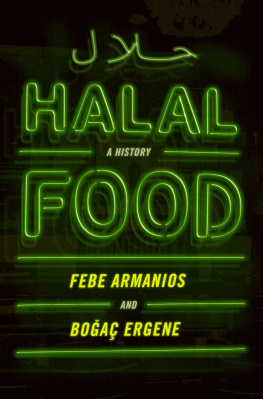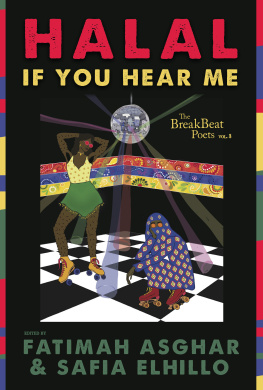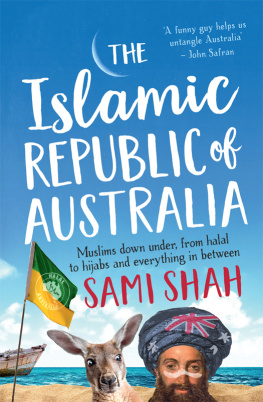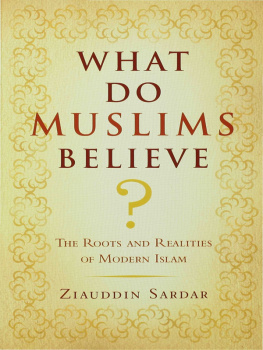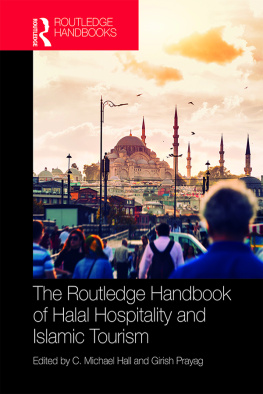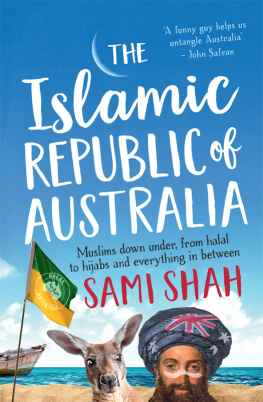Contents
Pagebreaks of the print version
HALAL FOOD
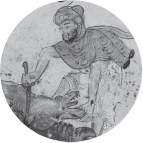
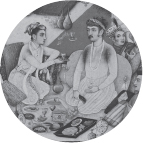


Oxford University Press is a department of the University of Oxford. It furthers the Universitys objective of excellence in research, scholarship, and education by publishing worldwide. Oxford is a registered trade mark of Oxford University Press in the UK and certain other countries.
Published in the United States of America by Oxford University Press
198 Madison Avenue, New York, NY 10016, United States of America.
Oxford University Press 2018
All rights reserved. No part of this publication may be reproduced, stored in a retrieval system, or transmitted, in any form or by any means, without the prior permission in writing of Oxford University Press, or as expressly permitted by law, by license, or under terms agreed with the appropriate reproduction rights organization. Inquiries concerning reproduction outside the scope of the above should be sent to the Rights Department, Oxford University Press, at the address above.
You must not circulate this work in any other form and you must impose this same condition on any acquirer.
Library of Congress Cataloging-in-Publication Data
Names: Armanios, Febe, 1974 author. | Ergene, Boa A., 1971 author.
Title: Halal food : a history / Febe Armanios and Boa Ergene.
Description: New York, NY : Oxford University Press, 2018. |
Includes bibliographical references and index.
Identifiers: LCCN 2017042076 (print) | LCCN 2017039349 (ebook) |
ISBN 9780190269050 (hardcover : alk. paper) | ISBN 9780190269067 (Updf) |
ISBN 9780190269074 (Epub)
Subjects: LCSH: Halal food. | Halal food industry.
Classification: LCC BP184.9.D5 A76 2018 (ebook) | LCC BP184.9.D5 (print) |
DDC 297.5/76dc23
LC record available at https://lccn.loc.gov/2017042076
CONTENTS
Let me bring you trays of food
And something that you like to drink.
You can use my soft words
As a cushion for your head.
Hafiz (d. 1390)
The aim of this book is to introduce readers to the Islamic conceptualizations of permissible (halal) and impermissible (haram) food. The book provides an overview of core halal food rules in historical perspective and in contemporary interpretations. It speaks to the authors shared interest in Islamic law, comparative religious practices, political economy, and food history. And the Persian lyricist and mystic Hafizs beautiful stanzas encapsulate this books planning and writing process, which involved many good meals shared between the authors as well as with colleagues, friends, and family throughout the world. We hope that they, and other readers, will enjoy the printed words on the following pages. Of course, any errors or omissions are the authors sole responsibility.
The project was completed, in part, with research and sabbatical support from the University of Vermont, Middlebury College, and Harvard University. At the University of Vermont, our gratitude extends to the History Department, particularly Paul Deslandes and Kathy Carolin; the College of the Arts and Sciences; and the Office of the Provost. At Middlebury, we are grateful to the History Department, the Office of the Dean of Faculty Professional Development and Research, the Center for the Comparative Study of Race and Ethnicity, and the Office of the President. At Harvard, the authors benefited from a residential Fellowship at the Islamic Legal Studies Program (ILSP) and from the generous assistance of the Islamic librarians at the Harvard Law Library, who helped us secure key documents for the book. In collaboration with Kristen Stilt, director of ILSP and professor at Harvard Law School, we organized a fruitful and rewarding workshop in May 2016 titled Animals, Law, and Religion and learned a great deal about the place of animals as food in various religious and geographic settings in conversations with the workshop participants: Kecia Ali, Beth Berkowitz, David Cassuto, Divya Cherian, David Clough, Bruce Friedrich, Chris Green, Aaron Gross, Dale Jamieson, Justin Marceau, Richard McGregor, Natalie Prosin, Jordan Rosenblum, Sarra Tlili, Anne Vallely, and Paul Waldau. We are grateful for their insights.
We would like to extend special thanks to our friend and colleague Kristen Stilt. She was supportive of this project from its initial inception, was a wonderful conversation partner throughout the writing stages, and offered meticulous advice and important guidance on various chapters. Similarly, we are indebted to Dana Barrow and Andrew Amstutz, both of whom carefully read entire drafts of the book and provided detailed feedback that was critical for the final revision process. Along the way, many friends and colleagues gave their time as well as important insights and pointers for parts of the manuscript. Heather Sharkey warmly shared her teaching materials about food in the Middle East. Jordan Rosenblum helped us consider many of the books major themes like animal slaughter, animal rights, and food ethics in a more comparative religious framework. Riad Bahhur offered us valuable suggestions and comments on different chapters. James Calvin Davis, Ayda Erbal, Bert Johnson, Chris Rominger, Rebecca Tiger, Julia Welsh, and Ela Yazc nan gave useful pointers on specific sections. Thanks also to Ata Anzali, Yavuz Aykan, Dima Ayoub, Elizabeth S. Bolman, Darin Davis, Bruce Friedrich, Caroline Kahlenberg, Jahd Khalil, Karin Hanta, Nomi Lvy-Aksu, Sujata Moorti, Ellen Oxfeld, Natalie Prosin, Safa Saraolu, and Claire Wilkinson for helping us locate or access sources and answering our queries. Ian Barrow, Rebecca Bennette, and James Fitzsimmons gave much appreciated advice and recommendations.
Several individuals contributed to the books overall production process. We would like to thank Christi B. Stanforth especially for her superb and thorough reading of various stages of the book manuscript and her detailed editorial suggestions. We truly valued her time, her passion for food studies, and her good cheer. With great care, patience, and attentiveness, Gregory T. Woolston prepared the beautiful maps. We would also like to thank Ayda Erbal, Celeste and Jeff Flynn, Michelle Kim, Hiroko Miyokawa, and Martin Naunov for kindly sharing their photographs. At Middlebury College, several research assistants gathered important materials for the book: Jiya Pandya, David Russell, and Winnie Yeung worked diligently and punctually during the projects earliest stages, while Lex Scott and Elizabeth Weiss assisted with final matters.
The idea for this book goes back to 2013 but later materialized in conversations with Susan Ferber, executive editor of American and World History at Oxford University Press. We are thankful for her professionalism, expertise, and enthusiasm. We would also like to thank the three anonymous reviewers for the press, whose comments and suggestions enriched the final draft. We are appreciative of the care and effort of our amazing production editor Maya Bringe, as well as other members of the production staff, including Patterson Lamb, John Grennan, and Jenny Volvovski.

